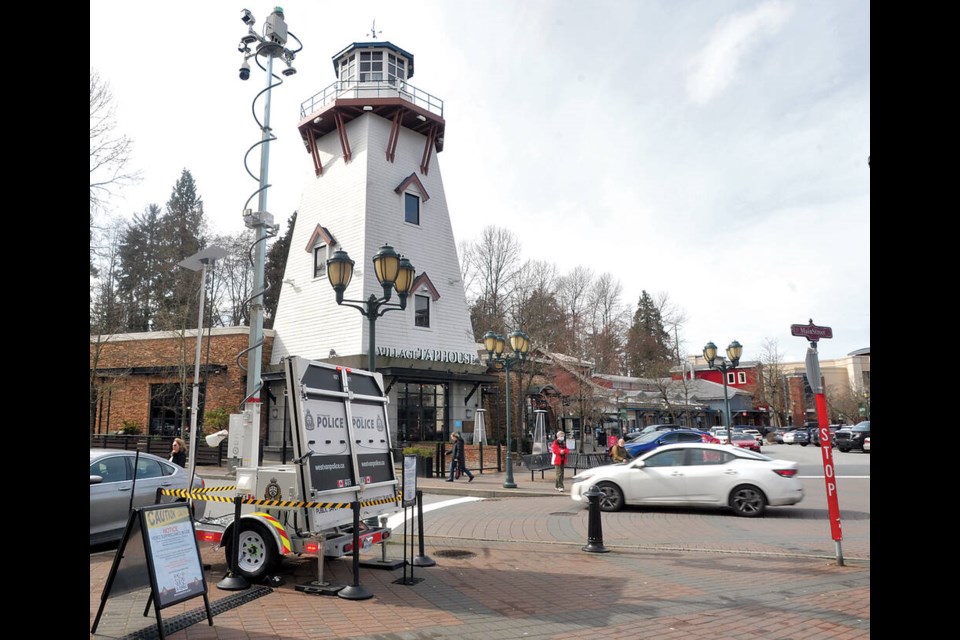While a tower of police cameras over Park Royal may seem harmless to paying customers, the looming spectre of state surveillance has the potential to encroach on our civil liberties, experts say.
The West Vancouver Police Department deployed its “public safety trailer” at the mall on March 7 and again at Ambleside Park for the Chaharshanbe Suri Persian Fire Festival on March 18.
In both cases, the department notified the public via social media.
“This mobile monitoring unit is strategically placed on a temporary basis to deter criminal activity and, when necessary, provide video evidence to assist in criminal investigations. The trailer supports public safety, prevents crime, and keeps #WestVancouver a wonderful place to live, work and play,” reads a post on X (formerly Twitter).
But the increase and normalcy of surveillance technologies like public safety trailers carry their own risks, said Meghan McDermott, a lawyer and policy director with the BC Civil Liberties Association.
“It’s still rare, and it should be rare, because we don’t want to be a society where the state’s watching people at all times,” she said.
McDermott did however offer some praise to WVPD for communicating the location and purpose of the trailer, and for offering additional information on the department’s website. Other organizations, such as Vancouver Police Department, have been criticized for using similar trailers with no publicly shared justification.
WVPD said the trailer could be deployed in key areas of concern, at large public events, at demonstrations or protests “with a risk of disorder or violence,” and in response to public feedback or concerns.
People have generally gotten used to surveillance at large events like summertime fireworks displays, McDermott said.
“Ideally, they should be doing that as boots on the ground, doing it themselves so that they can use their discretion to figure out what to focus on and what not to focus,” she said.
The civil liberties lawyer is more concerned with the idea of using surveillance technology during acts of protest.
“Especially when you’re being critical of what the state might be doing, and then to see the state using technology to track you as you’re critiquing them, it has a very chilling effect,” McDermott said. “The ability for people to protest is inherent in our Charter of Rights and Freedoms, and that should definitely be hands off by police.”
On the WVPD website, the department outlines how the public’s rights are protected while the surveillance trailer is used.
That includes the simple nature of the cameras being used, which don’t have facial recognition software or thermal imaging; all video is securely stored and only accessible to authorized personnel for investigations; and footage is retained only for a specific period of time, in accordance with legal requirements, WVPD said.
Department spokesperson Sgt. Chris Bigland said that the trailer doesn’t record audio, and that there aren’t any “notable” results to share from the trailer’s deployments so far.
Canadian citizens have a right to not be surveilled, lawyer says
In Canada, citizens generally have right to associate in public and in private, without their activities being watched by the state, McDermott said. But police activity can sometimes encroach on those freedoms.
Simply being a passenger in a vehicle pulled over in a traffic stop could result in an individual being flagged in police databases without ever knowing why.
“We’ve heard from lots of members of society that they didn’t even know that they had been seen at one point by a police officer with somebody who’s known to police, let’s say a gangster …, and then next thing you know, they can’t go out on the weekend,” she said. “And it’s really embarrassing and humiliating.”
Broader use of surveillance technology has the potential to create more situations like this, she cautioned.
For McDermott, surveillance should only be something that’s ad hoc, and not in use all the time.
“In theory, if we really wanted our agencies to have the best available evidence at all times, would we not have cameras absolutely everywhere, and give the state the right to our digital devices at all times?” she asked. “No, that’s what you call a police state with no anonymity…. We don’t think that’s reasonable,” McDermott said.
nlaba@nsnews.com
twitter.com/nick_laba
@nicklaba.bsky.social
 Want to stay updated on North Vancouver and West Vancouver news? Sign up for our free daily newsletter.
Want to stay updated on North Vancouver and West Vancouver news? Sign up for our free daily newsletter.






